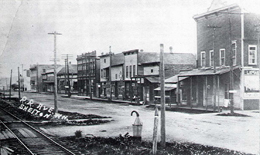On August 27, 1914, fire destroys 17 buildings and 20 stores in downtown Shelton. Mayor Mark Reed (1866-1933) is in Seattle on business when he hears of the fire. His chauffeur drives the 100 miles of mostly unpaved roads back to Shelton in just under three hours. Reed, who is also head of Simpson Timber, the county's largest employer, uses the disaster as an opportunity to rebuild downtown.
Shelton jumped from pioneer settlement to logging town in the mid-1880s when lumbermen built railroads to feed sawmills there. Tom Webb built the 50-room, first-class Hotel Webb at what would become the corner of 1st Street and Railroad Avenue. This structure burned on September 5, 1907, with the loss of 11 lives and 20 serious injuries. Mayor Reed had once stated "A frame town is always on a powder keg, and a bad fire with poor firefighting equipment and untrained volunteers would cost more than a little encouragement to the volunteers." In 1914, the city council passed an ordinance providing a payment of $2.50 for the first team to hitch to the City hose wagon and haul it to any fire.
At about 2:00 a.m., on August 27, the fire started in the Cafe Bodega restaurant (Pauley's Restaurant in Thomas) on 2nd Street. Soon the adjacent State Bank building was engulfed, as was Munson's store and McDonald's. The flames jumped across 2nd Street and Maxwell's, Needham's, and the Commercial Hotel caught fire. The belfry of the Methodist Church ignited as well as the barn for Lumberman's Mercantile and the Central Hotel and Laundry. The volunteers finally stopped the spread of fire at the concrete Hotel Shelton (which had replaced the Hotel Webb) at one end and the fireproof Lumberman's Mercantile at the other. The largest surviving object in the rubble was the bank vault, which took several days to cool before it could be opened.
Mayor Reed and Mason County Journal publisher Grant C. Angle (1867-1951) campaigned for modern construction. Shelton successfully rebuilt and prospered.

